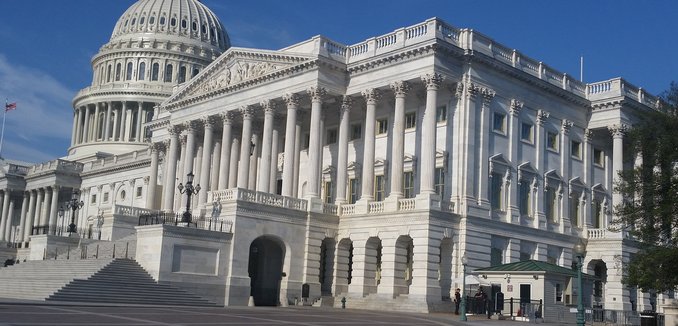A Democratic Party activist argued that the bipartisan Israel Anti-Boycott Act currently being considered by the United States Senate, “should hardly be controversial” because it “simply extends existing U.S. law” against foreign boycotts of Israel, in an analysis published Thursday in the Huffington Post.
Steven Sheffey, a blogger for the National Jewish Democratic Council (NJDC), addressed various objections raised by opponents of the bill.
The first objection, which has been raised by the American Civil Liberties Union (ACLU), is that the new legislation would stifle free speech. Steffey countered this by pointing out that “both this bill and existing law prohibit specific commercial conduct, not free speech.” The Anti-Israel Boycott Act would not penalize someone for exercising their First Amendment right to call for a boycott of Israel, but would impose criminal penalties “for cooperation with foreign governments, and under the new law, with international governmental organizations,” which boycott Israel.
Other critics, Sheffey noted, have pointed to many omissions and deletions in the bill, but “that is how laws are written, and how they have to be written to fit into existing statutory framework.” To suggest that the law was written this way to mislead people “reflects either disingenuity or ignorance of the legislative process.”
Sheffey also challenged the ACLU for “its benign description of the Boycott, Divestment, and Sanctions movement,” which seeks “to delegitimize Israel and advocates for policies that would effectively eliminate Israel as a Jewish state.” Moreover, he added that the ACLU failed to mention “the bipartisan concerns about BDS that motivated the Israel Anti-Boycott Act.”
Lastly, Sheffey noted that the bill also applies to products manufactured in the West Bank. While he expressed support for a two-state solution and called settlements an impediment to peace, “those who advocate boycotting West Bank goods assume that all that is needed to reach a two-state solution is pressure on Israel.” As he explained, “A two-state solution will require both Jews and Palestinians to relinquish their claims to land that they believe is rightfully theirs … Putting pressure only on Israel, as if Israel can unilaterally solve this problem, will only stiffen Israeli resistance and encourage Palestinian intransigence.”
Sheffey’s defense of the Anti-Israel Boycott Act echoes that of Northwestern University Law School Professor Eugene Kontorovich.
“We don’t really need to speculate about how this law will affect higher education, because we already know. Just like the existing anti-boycott legislation has never been used in any way that even vaguely has been thought to implicate free speech or higher education, the expansion of it is going to have equally zero effect,” Kontorovich told Inside Higher Ed.
In a recent talk on Capitol Hill, Kontorovich said that the Anti-Israel Boycott Act targets “material support” for internationally organized boycotts of Israel, which are based on a discriminatory treatment of Israel over a territorial dispute.
The impetus for the new legislation, Kontorovich explained, is an “unprecedented” boycott being organized by the United Nations Human Rights Council of Israeli businesses operating in the West Bank.
[Photo: soccerdhg / Flickr ]




